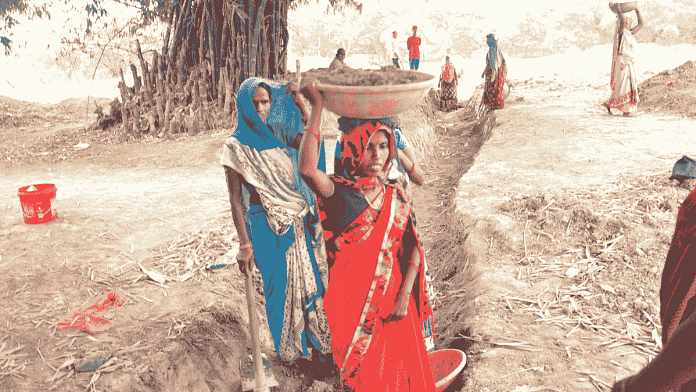New Delhi: The contentious Aadhaar Based Payment System (ABPS) for payment of wages to workers under the Centre’s rural employment guarantee scheme should not be made mandatory till the “mechanism is made foolproof”, the Parliamentary Standing Committee on Rural Development said in its report tabled Thursday.
The recommendation comes over a month after the Union rural development ministry made ABPS mandatory for seeking work under the Mahatma Gandhi National Rural Employment Guarantee Scheme (MGNREGS).
The ABPS was introduced by the Narendra Modi government in 2017 in a bid to ensure timely payment of wages to beneficiaries and also bring transparency into the system. Last February, the Centre made ABPS mandatory for payment of wages, but the deadline had to be extended four times following protests by workers and civil society members, and concerns raised by state governments, with the government finally making it mandatory this January.
Under the new system, a worker’s Aadhaar number is linked to their job card and to a bank account, which in turn is connected to the National Payments Corporation of India (NPCI) for them to receive payment directly in their accounts.
While the committee, chaired by Dravida Munnetra Kazhagam (DMK) MP Kanimozhi, appreciated the Centre’s effort to bring transparency to the system, it said that ABPS should not be made mandatory till all bottlenecks are cleared.
While suggesting that all challenges associated with the implementation of ABPS should be addressed, the House panel said: “Till the time all major bottlenecks associated with Aadhar Based Payment Bridge System are not tackled sufficiently, including the creation of awareness among the MGNREGA beneficiaries, the system should not be made mandatory”.
It pointed to the practical constraints faced by beneficiaries, such as their KYC compliance with their bank accounts, issues with Aadhaar cards, and ignorance about linking Aadhaar with bank accounts.
“One should always remember that the target community of MGNREGA are mainly less educated, technologically challenged, and having less fiscal management know-how,” the committee said in its report.
According to the information provided by the rural development ministry to the committee, until November last year, 14.12 percent of total job card holders were not Aadhaar enabled under MGNREGA. Even today, 1.53 crore active MGNREGS workers are not ABPS enabled or will be able to get payment through the ABPS system, data available on the ministry’s portal shows.
The rural development department should strike a fine balance between the use of technology for payment and ironing out the flaws in its implementation to ensure that wages are paid on time to workers and “they are not mandated with Aadhaar compliance till the mechanism is made foolproof”, the panel said.
ThePrint has reached the Union rural development ministry via phone and text message for a comment. This report will be updated if and when a response is received.
Activists have welcomed the move, saying that several workers have been finding it difficult to get work since the ABPS was this January.
“We have been saying this since last year that ABPS shouldn’t be made mandatory. While the union government has made it mandatory since January this year, there are close to 67 percent of registered workers who are currently ineligible to demand work under MGNREGS,” Chakradhar Buddha, a senior researcher with the non-profit LibTech India, told ThePrint.
According to its website, LibTech India works towards “improving transparency, accountability, and democratic engagement”.
Also Read: Ex-finance secy writes to Modi govt, red-flags ‘gaps’ in last-mile delivery of welfare schemes
Many workers still ineligible to get work, say activists
Ever since the idea of making ABPS compulsory for MNREGA was mooted, activists have been expressing concerns that the Centre’s push could result in many workers being denied work.
Sources in the rural ministry have denied this is happening. “Over 98.5 percent of active workers’ Aadhaar seeding has been done. Now, even if there is a work whose Aadhaar seeding is not done, he or she can ask for work and the process to bring him/her into the ABPS system will be initiated. The payment is made after 15 days so by then the ABPS system is completed,” a senior official aware of the development told ThePrint.
While making ABPS mandatory, the ministry had said if gram panchayats faced any issues due to technical problems, the government would consider “exemption from APBS on (a) case-to-case basis” until the matter is resolved. But another senior ministry official told ThePrint that the ministry has not received any such complaint or request.
Buddha from LibTech India claimed that there are workers who have been mapped under ABPS but are clueless about the account to which their payment has been transferred.
“This is due to the limited awareness on the ground, both on the side of workers, banks, and officials regarding the National Payment Corporation of India mapper,” he said.
The panel also raised the issue of diverted payments due to banking issues such as frozen accounts or non-seeding of Aadhar. The ministry in its response said that no such issue has been brought to the ministry’s notice.
“In the case of Aadhaar Based Payment (ABP) due to frozen account or non-seeding of Aadhaar or any other banking issue the respective transaction is rejected by the respective bank as per MIS,” the ministry had informed the panel.
(Edited by Uttara Ramaswamy)
Also Read: High deletion of names from MGNREGS rolls in poll-bound MP, Rajasthan, Chhattisgarh — NGO report



